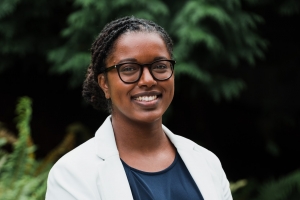
Dr. Sara Ghebremusse specializes in mining governance, law and development, and African legal studies and human rights. A rising star in her field, she believes in the law’s transformative potential in the fight against global poverty.
Since joining Allard Law in 2018, Dr. Ghebremusse has taught and published in areas including mining governance, law and development, African legal studies, human rights and transnational law. Dr. Ghebremusse is currently the principal investigator of a SSHRC-funded research project examining two Canadian mining conflicts in Southern Africa. She also co-led the development of Allard Law’s first Executive Learning Program in Mining Law and Sustainability.
In this Q&A, Dr. Ghebremusse shares her passion for teaching and research and explains why pushing for improved governance and accountability for Canadian mining companies is so critical.
What do you enjoy most about teaching and academia?
Academia didn’t seem like a career option for me until I worked as a Teaching Assistant during my PhD at Osgoode Hall Law School. I encountered few Black women faculty during my post-secondary education, so becoming a professor seemed impossible with so few women who looked like me as role models. It was my intention to pursue an international legal career throughout my LLM and early in my PhD. Then I began to really enjoy teaching. Interacting with a diverse group of intelligent and creative students while I was a TA reminded me of how powerful educators are. Plus, I worked alongside great professors who showed me the value of a progressive legal education. Since joining Allard Law, I have enjoyed teaching international legal topics to students in all years, as well as coaching the law school’s Jessup team. Students are always engaged and keen to understand the real-world implications of what they are studying. International law might not always seem relevant to Canadian law students. Yet, there are changing dynamics in the practice of business and law that are making events outside Canada’s borders increasingly relevant to lawyers here. Working in academia gives me the opportunity to explore these topics and be at the forefront of exciting legal research.
How did you first become interested in mining governance?
The law has significant transformative potential. I went to law school to understand how this could work in the fight against global poverty. During my JD at the University of Ottawa, I worked on two separate research projects related to mining in Sub-Saharan Africa. Although I didn’t realize it at the time, these projects sparked my interest in researching mining governance in Africa. This is incredibly relevant in Canada since almost 60 percent of the mining companies operating in Africa are Canadian.
What research topics are currently of particular importance to you that you would like to highlight?
There are a lot of important research topics in mining. The Supreme Court’s recent decision allowing a civil lawsuit against a Vancouver-based mining company Nevsun Resouces highlighted the new potential for transnational corporate accountability. Ongoing concerns remain about transparency, accountability, conflict, and Indigenous and community rights, especially regarding Canadian mining companies in Sub-Saharan Africa. It’s my hope that my project will illuminate many of these tensions. Mining is fundamental to the push for green technology to mitigate climate change. The need to mine sustainably to support the transition to a green economy amidst the climate emergency that has disproportionately affected Indigenous peoples, racialized communities, and countries in the Global South is another important area of research.
First published on June 13, 2022.